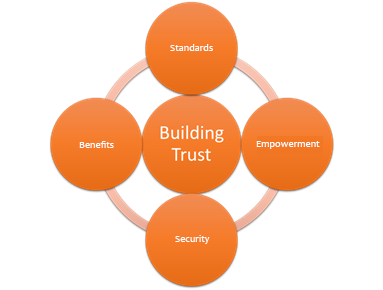When you go to any specialist, a doctor for example, the quality of the advice you’ll receive will depend on how much relevant information you share. If there is a level of trust between the two parties, sharing correct and up-to-date information will increase the chance of the best result.
As part of the case for Open Data as a part of the wider API based economy, it will not be enough to only share data with public bodies or commercial partners, but there will also be the need to verify the quality of data and to ensure that the correct permissions to access someone's data has been given and that these take into account where and when that data is used or combined with other sources of data.
A business collects many types of data from a customer and they may consider that to be their own asset, but that business may need to get permission to use and share that data, particularly when that is related to health or personal financial matters. This could be data that is generated by a customer over time through the usage of a service and from the interactions they have with different organisations, including recording their location.

Anyone developing a platform that is created to expose data should also consider how to maintain the accuracy, integrity and overall value of that data, as static sets of data will quickly lose their value when they become outdated and inaccurate. It will also not be enough to just allow customers to manage their own data, but a level of trust will need to be established between the customer and the business so that both sides benefit from the maintenance of open data.
Trust has to be developed by both parties involved in managing the data. A customer has to be entrusted to provide the correct information, and they can sign off that their data is correct as long as they are enabled to manage their own personal data and encouraged to make sure it stays correct and up to date, increasing the general value of that dataset. A business has to be entrusted to secure any data that the customer provides, including securing the access to open data and anonymising the source as needed, and should allow a customer to verify that a business is compliant with any agreements. They should aim to be a trusted broker in supplying valid data to and from their customers, either to provide better services for the customer or to enable a new product based on that data.
To achieve this, customers will need to be informed on how to manage their data and educated in the mechanisms that are put in place to enable this. A business will also need to take into account any potential "digital divide" that may develop between customers who are able to actively make changes to, and give permission to use their data and those who have no interest or are not capable of managing their data. If they cannot engage enough customers to take ownership, the overall value of any data sets that are made open and shared will decrease in value and any misuse of the data may very well have a detrimental impact on customer engagement with that organisation. The business will need to be seen as a trusted custodian for data.
So it's not just a case of creating a set of data and producing a mechanism to allow someone to read it. The custodian of the data, whether they are a private or public organisation, will also need to enable a set of management tools to go alongside the data itself. This is just one piece of the data infrastructure where ownership of data is shared, as proposed by the likes of the Open Data Institute, an organisation set up by founder of the World Wide Web Tim Berners-Lee, supported by the UK government and an increasing number of partner organisations.
Once the trust and maintenance of data ownership is in place, the custodian can then go ahead to combine data sources, enhancing and adding value to the original data. At this point they will be in a position to monetise access to the enhanced data and, as part of the trust mechanism with their customers, some of that generated value can be returned to each customer either directly as a payment, or as an additional benefit related to their products and services, motivating and engaging the customer to maintain both their data and their relationship with that organisation.
If a customer knows that their data is secure, well managed and they have a stake in its use, they may well be more inclined to engage with an organisation, something that will be key in developing the wider Open Data and API based Economy.
Whitepaper



Analyst Speak

(THIS) has been cited among notable vendors by Forrester Research in its report ‘The API Management Software Landscape, Q1 2024’. The report recognizes Torry Harris as a provider offering API management solutions with a geographic focus in the EMEA & APAC regions.

Forrester observes that the initial rush to “lift and shift” to the cloud has now been replaced by a focus on modernization and digital transformation. Cloud migration is the first step in a long journey to take advantage of the latest cloud-native technologies and services.

Torry Harris is a 'Strong Performer' in The Q3 2022 Forrester Wave™ for API Management Solutions. This report shows how each provider measures up and helps technology architecture and delivery (TAD) professionals select the right one for their needs.
Past Webinars








